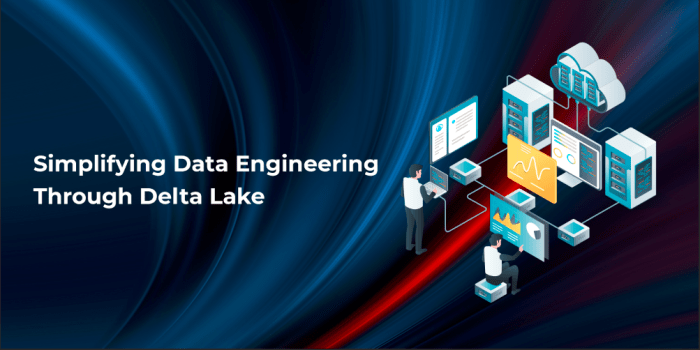Simplifying data engineering and analytics with Delta PDF is a transformative approach that revolutionizes data management. Delta PDF’s innovative capabilities streamline data ingestion, transformation, and storage, empowering organizations to unlock the full potential of their data.
With its intuitive interface and robust feature set, Delta PDF empowers data engineers and analysts to overcome the complexities of modern data pipelines. This comprehensive guide delves into the benefits, key features, use cases, best practices, and future trends of Delta PDF, providing a roadmap for organizations seeking to optimize their data-driven initiatives.
Benefits of Using Delta PDF for Data Engineering and Analytics
Delta PDF offers numerous advantages for simplifying data engineering and analytics tasks. Its ability to handle complex data sets and its compatibility with popular data processing tools make it an ideal choice for businesses seeking to streamline their data management processes.
Enhanced Data Ingestion and Storage
Delta PDF’s optimized data ingestion capabilities enable businesses to seamlessly integrate data from diverse sources, reducing the time and effort required for data preparation. Its columnar storage format ensures efficient data storage and retrieval, minimizing the computational overhead associated with data processing.
Simplified Data Transformation
Delta PDF provides a comprehensive set of data transformation capabilities that allow users to perform complex operations on their data with ease. Its support for declarative transformations enables users to define transformations using SQL-like syntax, simplifying the development and maintenance of data pipelines.
Improved Data Governance and Security
Delta PDF incorporates robust data governance and security features that ensure the integrity and confidentiality of data throughout its lifecycle. Its support for data lineage tracking allows businesses to monitor the origin and transformation history of their data, enhancing data transparency and accountability.
Key Features of Delta PDF for Data Engineering: Simplifying Data Engineering And Analytics With Delta Pdf

Delta PDF is equipped with a range of features that make it well-suited for data engineering tasks. These features include:
Flexible Schema Management
Delta PDF’s flexible schema management capabilities allow users to define and modify data schemas on the fly, eliminating the need for rigid schema definitions. This agility enables businesses to adapt to changing data requirements and incorporate new data sources seamlessly.
Data Versioning and Time Travel
Delta PDF’s data versioning and time travel capabilities enable users to track and access historical versions of their data. This feature allows businesses to recover from data errors, perform data audits, and analyze data trends over time.
Data Deduplication and Optimization
Delta PDF incorporates advanced data deduplication and optimization techniques that reduce data redundancy and improve storage efficiency. Its ability to automatically identify and remove duplicate records helps businesses minimize data bloat and optimize data storage costs.
Use Cases for Delta PDF in Data Analytics
Delta PDF finds application in a wide range of data analytics use cases, including:
Exploratory Data Analysis
Delta PDF’s interactive data exploration capabilities allow users to quickly and easily explore large data sets, identify patterns, and generate hypotheses. Its support for ad-hoc queries and visualizations enables businesses to gain insights from their data without the need for extensive data preparation.
Machine Learning and AI
Delta PDF’s ability to handle complex data sets and its compatibility with popular machine learning and AI frameworks make it an ideal choice for data scientists. Its support for data versioning and time travel enables data scientists to experiment with different models and track their progress over time.
Data Visualization and Reporting, Simplifying data engineering and analytics with delta pdf
Delta PDF integrates seamlessly with popular data visualization and reporting tools, enabling businesses to create interactive dashboards and reports that communicate data insights effectively. Its ability to handle large data sets ensures that visualizations and reports are generated quickly and efficiently.
Best Practices for Using Delta PDF

To maximize the benefits of Delta PDF, businesses should follow these best practices:
Optimize Data Ingestion
Businesses should optimize their data ingestion processes by using efficient data connectors, leveraging data compression techniques, and parallelizing data loading tasks. This will minimize the time and resources required for data ingestion.
Implement Data Governance and Security
Businesses should implement robust data governance and security measures to protect their data from unauthorized access, modification, or deletion. This includes defining data access controls, implementing data encryption, and conducting regular data audits.
Monitor and Tune Performance
Businesses should monitor the performance of their Delta PDF pipelines and make adjustments as needed to optimize efficiency. This includes identifying and addressing bottlenecks, tuning query parameters, and leveraging caching mechanisms.
Comparison with Alternative Solutions
Delta PDF compares favorably to alternative data engineering and analytics solutions in several key areas:
Scalability and Performance
Delta PDF’s distributed architecture and columnar storage format enable it to handle large data sets and complex queries efficiently. Its ability to scale horizontally ensures that businesses can meet their growing data processing needs without compromising performance.
Ease of Use and Flexibility
Delta PDF’s intuitive interface and support for popular data processing tools make it easy for users to adopt and integrate into their existing data pipelines. Its flexible schema management and data versioning capabilities provide businesses with the agility to adapt to changing data requirements.
Cost-Effectiveness
Delta PDF is a cost-effective solution for data engineering and analytics, offering a range of pricing options to meet the needs of businesses of all sizes. Its ability to reduce data storage costs and optimize data processing efficiency further enhances its cost-effectiveness.
Future Trends and Developments

The future of Delta PDF is bright, with several emerging trends and developments that will shape its evolution:
Cloud Integration
Delta PDF is expected to continue its integration with cloud platforms, providing businesses with seamless access to cloud-based data storage and compute resources. This will enable businesses to leverage the scalability and cost-effectiveness of the cloud for their data engineering and analytics needs.
Artificial Intelligence and Machine Learning
Delta PDF is expected to incorporate more artificial intelligence and machine learning capabilities, enabling businesses to automate data processing tasks and derive insights from their data more effectively. This will empower businesses to make data-driven decisions and improve their operational efficiency.
Data Security and Privacy
Data security and privacy will continue to be a key focus for Delta PDF, with new features and enhancements being introduced to protect data from unauthorized access and misuse. This will ensure that businesses can confidently use Delta PDF to manage and analyze their sensitive data.
Essential Questionnaire
What are the key benefits of using Delta PDF for data engineering?
Delta PDF offers numerous benefits, including simplified data ingestion, automated data transformation, optimized data storage, and enhanced data governance.
How can Delta PDF improve data analytics?
Delta PDF empowers data analysts with powerful features for data exploration, visualization, and reporting, enabling them to derive deeper insights from complex data sets.
What are the best practices for using Delta PDF effectively?
Best practices include optimizing data pipelines for performance and efficiency, implementing data governance policies, and ensuring data security measures are in place.